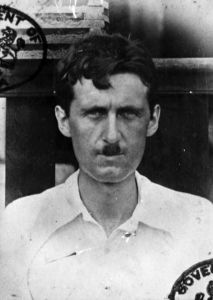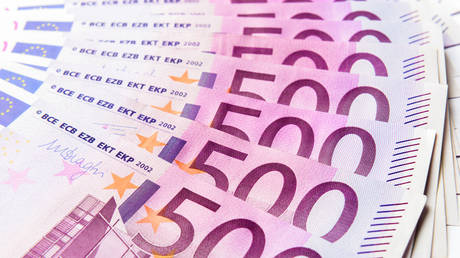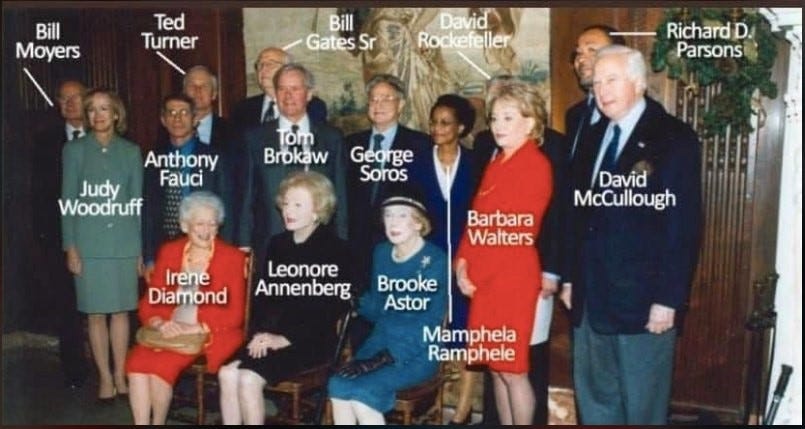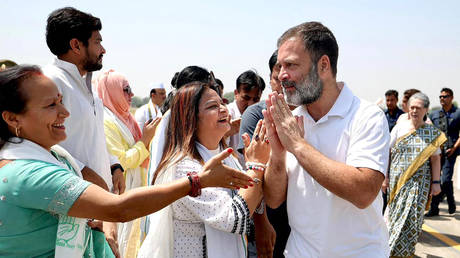A Family with the Wrong Members in Control: Orwell’s England
England is not the jewelled isle of Shakespeare’s much-quoted message, nor is it the inferno depicted by Dr. Goebbels. More than either it resembles a family, a rather stuffy Victorian family, with not many black sheep in it but with all its cupboards bursting with skeletons. — George Orwell, “England, Your England”
Evening has fallen, the swans are singing.
The last of Sunday’s bells is ringing.
The wind in the trees is sighing,
And old England is dying.
— The Waterboys, “Old England”
Anthony Charles Lynton Blair, more commonly known as Tony, and Eric Blair, more commonly known as George Orwell, share something in common in that they have both been disowned by the Left. While Tony won a landslide General Election victory for Labour in 1997, he is forever tainted for those who formerly adored him by the Iraq War he and Alastair Campbell, Blair’s Machiavellian aide de camp, did so much to engineer. And while Eric was more or less an unreconstructed socialist who wanted public ownership and income caps (as well as, bizarrely, an end to butlers), he also wrote Nineteen Eighty-Four. This is a book I have called of Koranic significance to the dissident Right, who should never let reference to it seem hackneyed as it continues to amaze despite being quoted at every turn. It is also a document which has disquieted many on the Left because, as Orwell himself might have said, it does rather give the game away.
Orwell’s political and cultural prescience aside, Eric Blair was primarily a writer. He even wrote a short apologia called “Why I Write” which opened with his conviction, at the age of five or six, that he would grow up to be a writer. He was a technical master of the English language, and should any reader only know him via Nineteen Eighty-Four, Orwell’s journalistic prose often has a far more languid, conversational tone than the harsh rigidities of his dystopian classic. This is nowhere better exemplified than by Orwell’s writings on England, from the political manifesto of “The Lion and the Unicorn” to the whimsical “In Defence of English Cooking.”
Blair the man was certainly marked by the eccentricity for which the English are noted and on which Orwell the writer often remarked. He and his wife Eileen once owned a goat, he was arrested and briefly imprisoned for being drunk and disorderly while researching Down and Out in Paris and London, and he had his knuckles tattooed with small pictures of grapefruit while serving as a police officer in Burma. Not the behavior expected of a product of the English public school system that has produced so many of that nation’s ruling class.
Orwell was born in India in 1903 and his family moved to England the following year. He spent much of his life in the quintessentially English town of Henley-on-Thames, home to the famous annual Oxford vs. Cambridge University boat race. He would suffer all his life from ill health, which rendered him unfit for military service, and he died from tuberculosis at the age of 46. Despite being a poor student, he was educated at England’s — and arguably the world’s — greatest public school (which means private school in England), Eton College. This left him with a hatred of snobbery, particularly in the ranks, as described in 1939’s “Democracy in the British Army”:
‘Democratising’ an army, if it means anything, means doing away with the predominance of a single class and introducing a less mechanical form of discipline.
What would Orwell have made of today’s drive for transgender troops in the military? Socialists, of course, despise any class difference, although there is no doubt that Orwell’s education was a safety net. With his academic pedigree, he could have stopped being down and out in Paris in London at any time and walked into a decent job, had he so wished. This is reminiscent of Jack Kerouac’s supposedly poverty-stricken time on the road, with Jack wiring his mother every time he needed money.
Orwell’s attitude to England is sometimes reluctantly imperial, sometimes sentimental. In “England, Your England,” he writes that “[o]ne cannot see the modern world as it is unless one recognizes the overwhelming strength of patriotism, national loyalty.”
This, of course, could apply to any country, but a few pages later Orwell gives an image of England which is one of his most famous non-novelistic passages:
The clatter of clogs in the Lancashire mill towns, the to-and-fro of the lorries on the Great North Road, the queues outside the Labour Exchanges, the rattle of pintables in the Soho pubs, the old maids biking to Holy Communion through the mists of the autumn morning . . .
Orwell uses a word with which we are all-too-familiar today to describe this parade of images: diversity. What a difference in meaning that term holds today, and the instability of meaning in the English language would be the subject of one of Orwell’s most notable essays: “Politics and the English Language.”
The English are gentle and tolerant, notes Orwell, although these are traits which they may have cause to regret today. “In no country inhabited by white men,” he writes, “is it easier to shove people off the pavement.” English nationalism is suitably reserved:
In England all the boasting and flag-wagging, the ‘Rule Britannia’ stuff, is done by small minorities. The patriotism of the common people is not vocal or even conscious . . . The working man’s heart does not leap when he sees a Union Jack.
A major part of Orwell’s distaste for the upper classes stems from their decline. Referencing a saying concerning his old school, he writes that:
Probably the Battle of Waterloo was won on the playing-fields of Eton, but the opening battles of all subsequent wars have been lost there. One of the dominant facts in English life during the past three quarters of a century has been the decay in ability of the ruling class.
This leads to one of Orwell’s greatest images, in “Shopkeepers at War,” that “England is a family with the wrong members in control.” This is a family which ran England for a decade in the 1930s “without even discovering that Hitler was dangerous.” The attitude of the English to Empire he calls, almost affectionately, “double-faced.”
Still, Orwell adores the little Englishman and his little woman, and the quirkiness and fascination with a world of small concerns which exemplifies his people, and which is subsumed under what he calls “the privateness of English life”:
We are a nation of flower-lovers, but also a nation of stamp-collectors, pigeon-fanciers, amateur carpenters, coupon-snippers, darts-players, crossword-puzzle fans. All the culture that is most purely native centres around things which even when they are not communal are not official — the pub, the football match, the back garden, the fireside and the ‘nice cup of tea’.
This is so accurate that I recognize that world — and its demise — in my own lifetime. The English have always taken being slightly silly very seriously. They like their private pastimes as much as their communal gatherings, and despise the “Nosy Parker.”
Orwell had little time for English intellectuals, dubbing intellectualism a foppish, European fad. The ethnomasochism of the supposedly highbrow is famously summed up in the observation that “almost any English intellectual would feel more ashamed of standing to attention during ‘God Save the King’ than of stealing from a poor box.”
Taken as a whole, Orwell’s commentary on the country that made him is pleasingly similar to his depiction of that country, rather disorganized and slightly eccentric, and his description of his English fellows is as sentimental as it is sardonic. As for the retention of the quality of Englishness, he sounds a warning as prescient as anything in Nineteen Eighty-Four: “It needs some very great disaster, such as a prolonged subjugation by a foreign power, to destroy a national culture.”
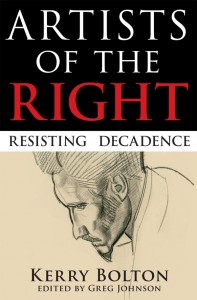
You can buy Kerry Bolton’s Artists of the Right here.
For all his warnings about the wrong family members running the show, he could not have foreseen that subjugation would be the work of globalist fifth-columnists, nor what his own favored brand of socialism would mutate into.
Sometimes Orwell’s socialism is almost laughable, such as his comment that “the lady in the Rolls-Royce car is more damaging to morale than a fleet of Goering’s bombing planes.” Something else Orwell’s ingrained socialism failed to predict was the hard Leftism that would infest the trade unions, who Orwell takes at face value as “devoted to raising wages and improving working conditions.” English unions now are as woke as any other institution, and still as Bolshie as they were in the 1970s. Orwell does note the influence of Communists in the unions in the 1920s and ‘30s, but scolds them rather for “alienating the middle classes from socialism.” Love of nation is misused by socialism, he writes, and “[a]n intelligent Socialist movement will use their patriotism, instead of merely insulting it.” One of the points in Orwell’s six-point plan for socialism would also surprise him by its success today in another form, as he proposes “an Imperial General Council, in which the coloured people are to be represented.” Well, we certainly got that.
It is a charming piece of synchronicity which typifies Orwell that in 1946 he wrote both “Politics and the English Language” and, in a piece for the London Evening Standard, instructions on how to make the perfect cup of tea. Rather than idly watch as one of history’s great languages floundered, Orwell believed that the application of basic rules could halt the decline. He writes that:
Our civilization is decadent and our language — so the argument runs — must inevitably share in the general collapse. It follows that any struggle against the abuse of language is a sentimental archaism, like preferring candles or hansom cabs to aeroplanes.
He compares the vicious circle of linguistic decay with alcoholism:
A man may take to drink because he feels himself to be a failure, and then fail all the more completely because he drinks. It is rather the same thing that is happening to the English language. It becomes ugly and inaccurate because our thoughts are foolish, but the slovenliness of our language makes it easier for us to have foolish thoughts.
This rehearses the model of language in Nineteen Eighty-Four, in which the ability of people to think is circumscribed by central control over language and meaning, and the resultant and deliberate curtailing of both. If you don’t have access to the words, you can’t have access to the thoughts. Words and their attributes — metaphor, imagery, description — also lose their meaning through overuse, and his famous comment on the word “fascism” still applies, doing double duty today with “racism”: “The word Fascism now has no meaning except in so far as it signifies ‘something not desirable’.”
It is far from pompous to believe that the English language needs defending against bad usage, but Orwell’s model shows that this is more than just “Little Englander” pride. English is still the lingua franca (which must annoy the French), and Orwell states that its defense is not the job of “professional writers” alone. Orwell isolates five separate instances of what he deems bad written English, and the two common faults he finds in his hall of shame are “staleness of imagery [and] lack of precision.” Orwell himself was a very precise writer, his journalistic experience honing his style to allow the observance of detail to be foregrounded. He also advocates the avoidance of cliché, the enemy of every serious writer.
Any writer who is serious about his craft would do well to read the piece, which is remedial as much as anything else. Both good and bad writing, he believed, proliferated by imitation and so could be corrected and improved. He was always fond of lists, and his inventory of errors contributing to the decline of English has as its center of gravity his belief that the prose of his time suffered from what he calls a lack of “concreteness.” His time as a journalist at the BBC honed his writing to reject the frivolous, abstract, and vague. A statue of Orwell stands outside the BBC’s headquarters in White City, London, and the institution now under so much fire was clearly recognizable as the Ministry of Truth in Nineteen Eighty-Four.
I have to say Orwell nails me on two of his critical points: pretentious language and the use of foreign words. I don’t think my language is pretentious because I am not pretending to anything by using it, but the criticism has been levelled. With foreign words, however, he has me bang to rights, and even includes on his blacklist one of my favorites: mutatis mutandis, a philosophical term which means “changing all that needs to be changed.” One might write, for example, “just as the top of an oven is the hottest part, so too, mutatis mutandis, the coldest part of a fridge is at the bottom.” So, guilty as charged. Oh well, nil desperandum.
It is an entertaining game of make-believe to wonder what important figures from the past would make of the present were they to be reincarnated. Orwell would probably look at the cultural and politically stalemated quagmire the West has become (he minted the phrase “cold war”), smile wryly below his pencil moustache at the accuracy of some of his predictions, roll a ruminative cigarette, and pack his case before moving back to Jura, the remote Scottish island where Eric Blair wrote 1984 in a tiny cottage. In our chaotic, end-of-days world, Orwell would feel even more like the original title of his most famous work: the last man in Europe.

